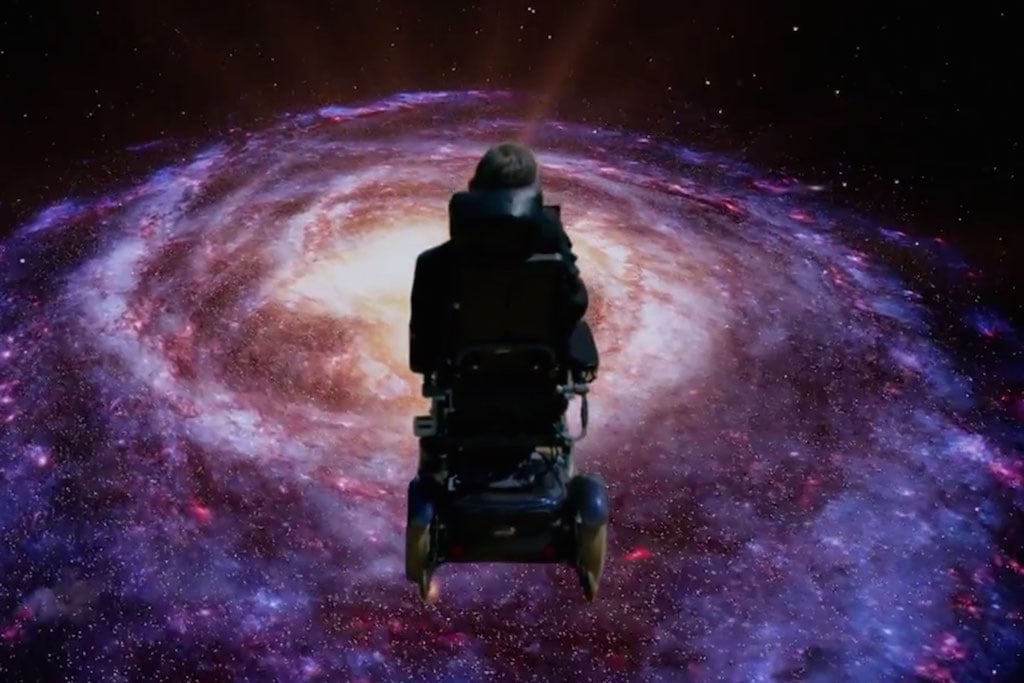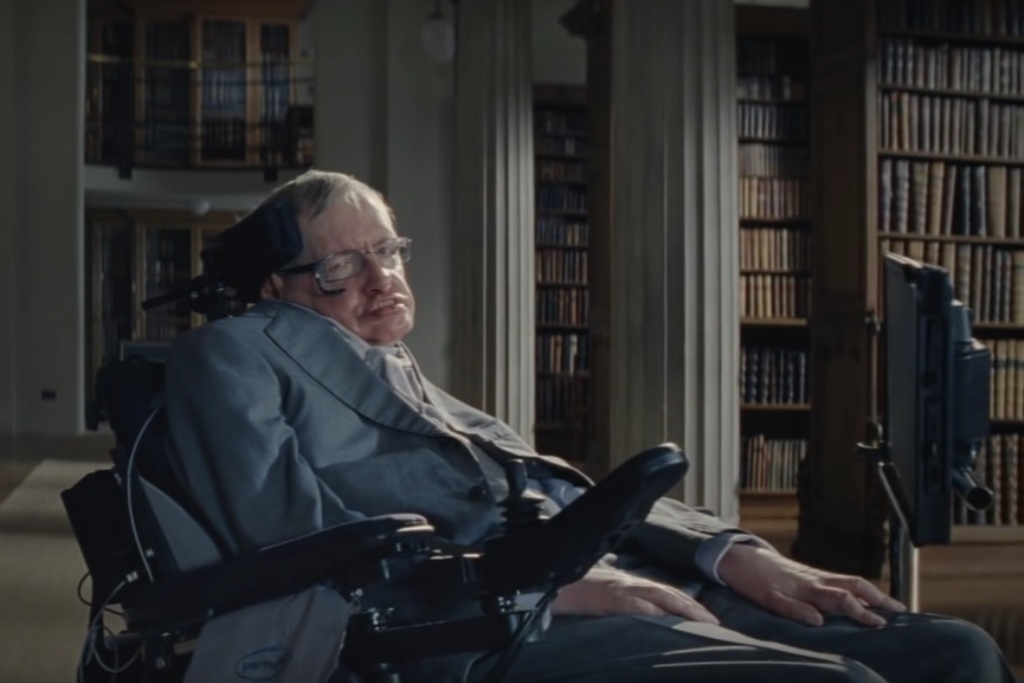Saying Stephen Hawking Is “Finally Free” Of His Wheelchair Is An Insult To His Legacy
We are not trapped by our wheelchairs — quite the opposite.

Stephen Hawking died two days ago. He was an extraordinary and uncommon academic, a scientist with a deep sense of artistry and a wicked sense of humour. And he was a bright fire in the lonely sky of disabled academia.
I am not a scientist. But I am a wheelchair-using academic, and I have a lot of feelings about space; my thesis has “cosmogonies” in the title. Hawking’s work was a joy and his presence in the world was a comforting reminder that people like me belong in academia just as much as any abled person does.
So it is disappointing, and deeply hurtful, to see how abled people are handling the news of Hawking’s death.
Many abled people have created artistic depictions where Hawking’s spirit is seen standing or walking away from his wheelchair. Leaving aside the fact that Hawking was a staunch atheist who described the idea of an afterlife as a “fairy story”, this fundamentally misunderstands the function of a wheelchair in a disabled person’s life.
Hawking is not “finally free” of his wheelchair now that he is dead. His wheelchair is the thing that gave him freedom during his life. The only time he ever envisioned himself mystically floating away into a sparkly cosmos, it was with his chair: go ahead and watch his cover of Monty Python’s ‘Galaxy Song’ if you want to see for yourself.
Several disabled people have already written about the ableist garbage fire arising out of the media coverage of Hawking’s passing. This sort of thing often happens when disabled public figures die, though the scale is perhaps unprecedented; others have already expressed that Hawking was “probably the most famous person with a physical disability” of our time.
Obituaries have written about Hawking’s body in derogatory and objectifying ways, describing him as “crippled”, “increasingly useless”, “failing”, and “desperately disabled”. Various news outlets have described him as “wheelchair-bound”, “confined to a wheelchair”, “chained to a wheelchair”, or “trapped”.
Wheelchairs are mobility aids. They aid our mobility. We are not trapped by them — quite the opposite. I don’t go around describing bipeds as being chained to their shoes.
“Without Imperfection, Neither You Nor I Would Exist”
Hawking himself was pragmatic about his disability, even expressing at times that he felt his disability had augmented his way of thinking and being in the world. At a conference in 2008 he told his audience, “I have been very lucky that my disease has not been a serious handicap, indeed it has probably given me more time than most people to pursue the quest for knowledge”.
In an interview with the New York Times he said “I don’t have much positive to say about motor neurone disease. But it taught me not to pity myself, because others were worse off and to get on with what I still could do. I’m happier now than before I developed the condition.”
He found hope and gladness in the relative insignificance of human existence on a “minor planet of a very average star”. “Perfection simply doesn’t exist,” he said. “Without imperfection, neither you nor I would exist.” He had a keen sense of humour. “Life would be tragic if it weren’t funny.”

Photo by Lwp Kommunikáció via Flickr
Hawking understood his disability as a fundamental part of himself. He regarded his speech synthesis software as his voice. In his book Black Holes and Baby Universes he wrote “One’s voice is very important… This synthesiser is by far the best I have heard because it varies the intonation and doesn’t speak like a Dalek. The only trouble is that it gives me an American accent. However, by now I identify with its voice. I would not want to change even if I were offered a British-sounding voice. I would feel I had become a different person.”
He did want a cure for his condition, or “at least a halt to its progression”. I can sympathise. I want similar things: treatment, pain management, the delaying of inevitable degeneration. I want to live as much and for as long as is possible. I do not want a cure for myself, and I would not prefer to be abled.
In my community of disabled activists we are often reluctant to speak in a nuanced way about cure narratives, because cure rhetoric is so often a weapon wielded against us, used to imply that the world would be better without us in it, that we would be better off dead or inexistent. Eli Clare has written at length on the subject in his new book Brilliant Imperfection: Grappling with Cure.
There must be space to advocate for healthcare without eugenics, for the alleviating of disabled suffering without misconstruing disability as suffering.
An Unrivalled Legacy
Hawking’s life was certainly not characterised only by suffering. He had a family who he loved. He had an indescribably impressive body of work; he discovered Hawking radiation; he made incredible discoveries around singularities, relativity, and black holes; he has advanced the sum of human knowledge around the origin of the universe.
He was, according to those who knew him, “notorious for his wild driving along the streets of Cambridge, not to mention the intentional running over of students’ toes and the occasional spin on the dance floor at college parties”. He once ran over the feet of Prince Charles, and his biographer Kitty Ferguson wrote that one of his regrets in life was not being able to run over the feet of Margaret Thatcher. (This, he said, was “a malicious rumour. I’ll run over anyone who repeats it.”)
Hawking was a dedicated activist and anticapitalist who supported the liberation of Palestine, called for action on climate change and nuclear disarmament, and fought hard for the rights of disabled people. Right before he died he was fiercely campaigning against the privatisation of Britain’s National Health Service. He wrote in the Guardian that “In my case, medical care, personal life and scientific life are all intertwined”, and used that experience to advocate for healthcare reform.
In the 2011 preface to the World Health Organisation’s first World Report on Disability, he wrote that “It is very clear that the majority of people with disabilities in the world have an extremely difficult time with everyday survival… Addressing these [attitudinal, physical, and financial] barriers is within our reach. In fact we have a moral duty to remove the barriers to participation, and to invest sufficient funding and expertise to unlock the vast potential of people with disabilities.”
Of his scientific work, his scholarly peers said that he “took the most obscure stuff out there in the cosmos and made it accessible”. I can’t think of a greater tribute for a disabled scientist.
His legacy is in his work. “Where there’s life, there’s hope,” he once said. “Remember to look up at the stars and not down at your feet. Try to make sense of what you see and wonder about what makes the universe exist. Be curious. And however difficult life may seem, there is always something you can do and succeed at.
“It matters that you don’t just give up.”
—
Robin M. Eames is a queer crip punk poet who is only mostly dead. They live on Gadigal land. You can find them online at robinmeames.org and @robinmarceline.

